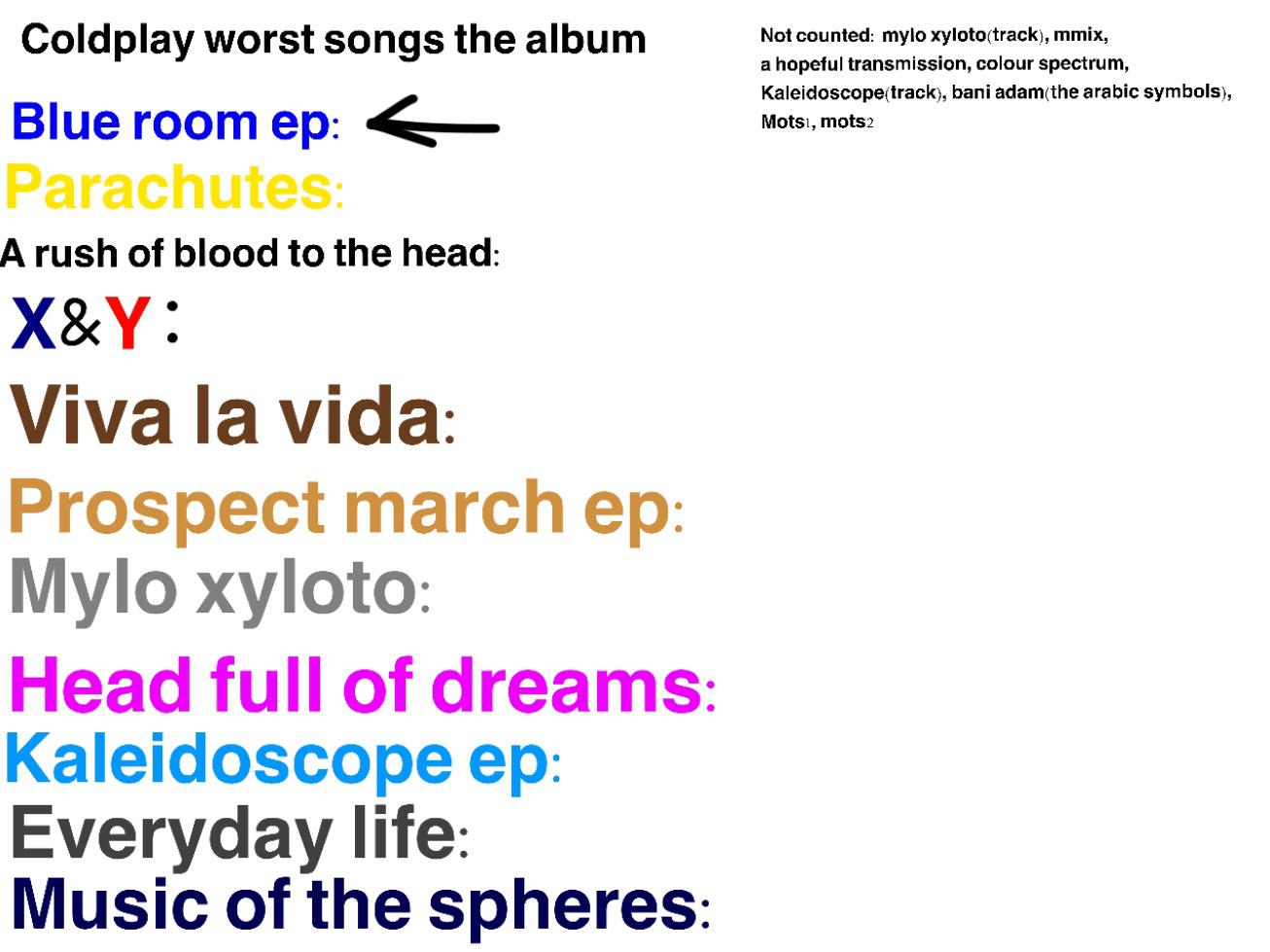Musics
Which is the Worst Coldplay Album?
When it comes to evaluating the discography of a band as renowned as Coldplay, the notion of a “worst” album can be deeply subjective. Fans of the English rock band might have different expectations or emotional connections to each release, which complicates the discourse. However, let’s delve into a few albums that often receive criticism and ponder the underlying factors contributing to their perceived shortcomings.
A Divisive Release: Ghost Stories

One album that frequently arises in conversations about Coldplay’s lesser works is Ghost Stories. Released in 2014, it marked a significant departure from the band’s earlier, more vibrant sound. The haunting melodies and introspective lyrics reflect themes of heartbreak and loss, resonating with some listeners but leaving others feeling disconnected.
The Shift in Tone and Aesthetics

Critics pointed out that the album’s darker tone lacked the anthemic qualities that characterized hits like “Viva La Vida.” This dichotomy suggests a rift between fans looking for the familiar Coldplay sound and those who appreciate the band’s evolution toward a more subdued aesthetic.
Emotional Connection and Artistic Vision
For some, the vulnerability and raw emotion expressed in Ghost Stories resonated deeply, as they connected with the album’s exploration of personal loss and the fragility of relationships. However, others may have felt that the band strayed too far from the uplifting, stadium-filling sound that had previously defined their success.
Divergent Expectations and Backlash
The shift in Coldplay’s musical direction with Ghost Stories was met with a mixed response from fans and critics alike. While the album’s artistic merits were praised by some, the perceived departure from the band’s established style led to a polarized reaction, with many listeners feeling that the album lacked the signature Coldplay charm.
Experimentation vs. Expectation: Everyday Life
Another contender for the title of “worst” album could be Everyday Life, released in 2019. While it’s celebrated by some for its ambitious scope—attempting to tackle social issues, including world politics and human rights—others found it uneven and unfocused.
The Duality of Everyday Life
The duality of the album, split into two halves (Sunrise and Sunset), left some listeners feeling like they were on a rollercoaster of ideas that didn’t quite mesh. The experimental elements may appeal to a niche audience, yet they risk alienating long-time fans who crave the cohesive sound the band mastered in earlier projects.
Tackling Sociopolitical Themes
Coldplay’s decision to address complex sociopolitical themes in Everyday Life was seen by some as a bold and commendable move, reflecting the band’s desire to use their platform to shed light on important global issues. However, the execution of these concepts was not universally praised, with critics arguing that the album lacked a clear, coherent narrative.
Divergent Reactions and Artistic Growth
The polarized reactions to Everyday Life highlight the challenges faced by established artists when they choose to venture into uncharted territory. While some fans may have appreciated Coldplay’s willingness to explore new musical and thematic directions, others felt that the band had strayed too far from the sound that had initially drawn them in.
The Shadow of Commercial Success: XY

Treading further back into their catalog, XY, released in 2005, often finds itself at the lower end of fan rankings. While it produced chart-topping singles like “Fix You” and “Speed of Sound,” many critics argue the album feels bloated and overproduced, lacking the raw energy of A Rush of Blood to the Head.
The Pursuit of Commercial Success
This raises an interesting point; does an album’s commercial success overshadow its artistic integrity? In chasing radio play, did Coldplay lose some of the soul that made them relatable to their audience?
Balancing Artistic Integrity and Commercial Appeal
The discussion surrounding XY highlights the delicate balance that artists must strike between maintaining their creative vision and appealing to a broader audience. While commercial success is undoubtedly important for sustaining a band’s longevity, it can also come at the expense of the raw, unfiltered expression that often resonates most deeply with fans.
Nostalgia and the Early Coldplay Sound
These questions evoke a sense of nostalgia for the earlier days when Coldplay’s music felt more genuine and less tailored for mass consumption. Fans who fondly remember the band’s initial rise to prominence may view XY as a departure from the sound that first captured their hearts and minds.
A Broader Perspective: The Nature of “Worst”

It’s crucial to challenge the very idea of labeling one album as the “worst” of Coldplay. Music is, after all, a profoundly personal experience. For every fan who dismisses Ghost Stories as lackluster, there’s another who finds solace in its quiet beauty. Similarly, while some view Everyday Life as chaotic, others applaud its willingness to confront tough topics head-on.
Subjectivity and Personal Experiences
This duality illustrates that what resonates varies significantly across listeners, influenced by personal experiences, mood, and a myriad of other factors. In essence, the question of which Coldplay album is the “worst” opens up a deeper exploration of artistic expression versus audience expectation.
Artistic Evolution and Collective Consciousness
Each album is a snapshot of a moment in time, reflecting not just the band’s creative journey but also the collective consciousness of its listeners. As we dissect these works, we should consider not only their individual merits but also the broader implications they bear within the musical landscape.
Embracing the Diversity of Perspectives
By acknowledging the subjective nature of this discourse, we can move beyond simplistic labels and instead celebrate the diverse perspectives that Coldplay’s music has inspired. The “worst” album for one listener may very well be the most cherished for another, and that is the beauty of the creative process.
Ultimately, the search for Coldplay’s “worst” album is a complex and highly personal endeavor. Each release represents a unique chapter in the band’s artistic evolution, and the way in which they are received depends on the individual listener’s preferences, emotional connections, and expectations. Rather than focusing on designations of “best” or “worst,” it may be more productive to embrace the nuances and complexities that characterize Coldplay’s discography, recognizing that the true value of their music lies in its ability to touch the hearts and minds of listeners from all walks of life.
